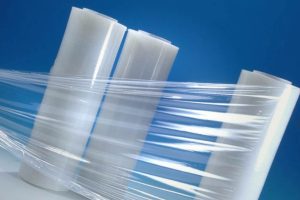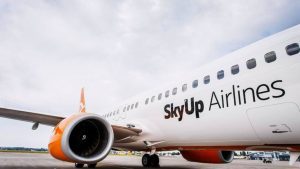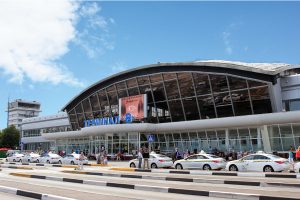
The Interdepartmental Commission on International Trade (ICMT) of Ukraine has introduced a special three-year duty on the import of some types of polyvinyl chloride (PVC) suspension and polyethylene, reducing its rate compared to the preliminary duty from 18% to 12.4% in the first year and again slightly narrowing its application in relation to PVC.
As stated in the announcement in the Uriadovy Kurier newspaper on November 21, the decision of the commission under an application of Karpatnaftokhim LLC (Kalush, Ivano-Frankivsk region) was made on November 20.
In the first decision made on May 22, the special duty was applied to polyethylene with a specific gravity of 0.94 or more, classified by codes 3901 20 10 00, 3901 20 90 00 of tariff heading, and polyvinyl chloride, classified by codes 3904 10 00 00, 3904 21 00 00, 3904 22 00 00.
This decision came into force on June 8, was suspended by the District Administrative Court of Kyiv on June 10 in the form of an interim measure under a claim of Subos-Techno LLC, and now the ICMT canceled it. The plaintiff said that initially the investigation was initiated under two commodity codes of the Ukrainian tariff headings, and the special duty was introduced under three codes, of which only one coincides with the original two. Subos-Techno also claimed that the PVC of the KSR-67 brands (for the production of rigid, semi-rigid and plasticized PVC, pipes, profiles, films, sheets) and KSF-70 (for the production of plasticized films, profiles, insulation, injection molded parts) are also different from those imported on the market.
As a result, on June 22, the commission narrowed the application of the provisional duty on PVC, indicating that it is a product with a Fickentcher constant in the range from 59 to 72, which can be classified under code 3904 10 00 00, except for emulsion and microsuspension polyvinyl chloride.
In the new decision, the duty is set for PVC with a Fickentcher constant from 64 to 69.

SkyUp (Kyiv) will start flights to Berlin (Germany) from March 29.
The press service of the airline said on Tuesday that the flights will be to the new Berlin Brandenburg Airport Willy Brandt on Mondays, Wednesdays and Fridays.
“Germany will become one of the new destinations of our summer navigation, which we are preparing to announce in the near future,” SkyUp said.
For comfortable and safe travel, the airline recommends to additionally check the current rules for entry and vacation in the airline flight program countries on the eve of departure.
In 2019, SkyUp Airlines performed 12,198 flights and carried more than 1.7 million passengers (the shares of regular and charter flights of the total number of flights were almost the same).
In the next five years, the air carrier planned to increase its share of the Ukrainian air transportation market up to 50%.
Skyup Airlines LLC was registered in Kyiv in June 2016. The founder is Tetiana and Yuriy Alba’s ACS-Ukraine LLC, which also owns the JoinUp! tour operator.

Mobile network operator Kyivstar has increased its 4G coverage in Zaporizhia and Kherson regions; the high-speed mobile coverage area includes 155 more settlements, where 76,000 people live.
The press service of the operator said on Monday that in particular, in Zaporizhia region, the territory of access to 4G Internet expanded by 42 settlements, in Kherson – by 113.
Kyivstar began to provide high-speed mobile Internet services at 900 MHz in the villages of Andriyivka, Davydivka, Mykolayivka, Mostove, Novoprokopivka, Rozivka, and Semenivka (Zaporizhia region), Brylivka, Vysoke, Davydiv Brid, Dolmativka, Kostohryzove, Mykhailivka, Novodmytrivka, Rozdolne, Sirohozy, Stara Mayachka, and Tiahynka (Kherson region).
In order to improve 4G coverage in these settlements, 27 base stations in the LTE 900 band have been installed.
Currently, the total number of mobile base stations of the company exceeds 38,000.
According to the company, Kyivstar has already provided access to 4G for almost 85% of the Ukrainian population. In the first nine months of 2020, more than UAH 4 billion has been invested in the development of new mobile communication technologies.

The list of 103 priority investment projects until 2023, approved by the Cabinet of Ministers at a meeting on Wednesday, includes 14 airports.
According to the accompanying documents to the decree, in particular, in the specified list, the resumption of core activities and further development of the international airport in Cherkasy; reconstruction of the airfield of Ivano-Frankivsk International Airport; reconstruction of the international airport in Chernivtsi (all are funded from the state and local budgets, investor funds).
In addition, the priority is given to modernization of the material and technical base of Kherson International Airport (funding from the state and local budgets, credit funds); reconstruction of the international airport in Vinnytsia, the international airport in Odesa (the third stage of construction); the international airport in the city of Dnipro; construction of a new airport in Zakarpattia; reconstruction of the international airport in Poltava (all are funded from the state and local budgets, investor funds).
In addition, it is planned to renew the infrastructure of Rivne International Airport municipal enterprise (exclusively at the expense of the investor); to renovate the runway, buildings, networks of Sumy Airport municipal enterprise (at the expense of the state and local budgets, investor funds, credit funds); to reconstruct international airports in Kryvy Rih and Mykolaiv (at the expense of the state and local budgets, investor funds); to reconstruct and modernize the airport in Zhytomyr (at the expense of the investor and the state budget).

It’s no secret that the food industry both in the world and in Ukraine can no longer do without chemical additives. Dyes, preservatives are used by manufacturers of confectionery products, dairy products, drinks, sausages and much more.
The Club of Experts project and Doctor of Biological Sciences Sviatoslav Morozov analyzed all food additives and made a rating of the top ten most harmful food additives.
The expert notes that in the 21st century many products cannot be produced without special additives due to the technical nuances of their production. Most of the additives are intended to extend the shelf life of food for transporting these products both across the country and around the world.
The Club of Experts and Sviatoslav Morozov defined ten main additives in products among those undesirable for frequent use: E211, E122, E124, E110, E952, E131, E105, E107, E222, E126. A conscientious manufacturer, according to the law, must indicate the full composition of the product on the packaging, therefore, when buying a food product, one should pay attention not only to the expiration date, but also to what this product is made of.
How harmful E additives are, what can be the consequences for health, which human organs they can affect and how to minimize such an effect on the human body, watch the new issue of the Club of Experts project on the YouTube channel
CLUB OF EXPERTS, DIET, E ADDITIVES, EXPERT, HARMFUL ADDITIVES, SUPPLEMENTS
Structure of export of services in 1st halfyear of 2020 (graphically).
